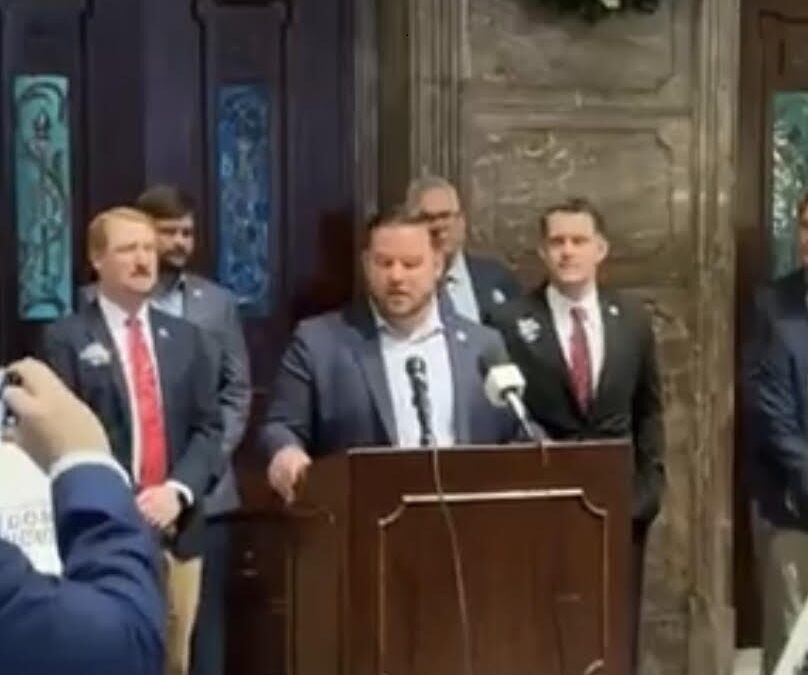Freedom Caucus spokesman and Republican House District 88 Representative, R.J. May, holds a press conference citing Lexington School District One in violation of state law by teaching Critical Race Theory.
The South Carolina Freedom Caucus filed a lawsuit November 16th, against Lexington School District 1, for allegedly teaching Critical Race Theory. The Freedom Caucus is made of Conservative Republican House Representatives led by caucus vice-chairman District 88 Rep. R.J. May, of Lexington.
Current state law prohibits the teaching of CRT in any form. State representatives first learned of the violation when whistle blower Adam Mahdavi stepped forward revealing that Lexington One School District had a consultant instructing and teachers receiving instruction on how to implement CRT in the classroom unbeknownst to parents.
May said at the news conference that Lexington District One refused to comply with state law and indoctrinated students and staff derived from Critical Race Theory. He also implicated EL Education. He said that EL Education exists to indoctrinate students and teachers and departs from equality under the law.
May said, “They have rebranded it as diversity, equity and inclusion, as anti-racism, as culturally relevant pedagogy.” He said “regardless what it is called it is the same pernicious, racist nonsense.”
Experts say Critical Race Theory is practiced and applied to K-12 education through praxis, an element of Critical Race Theory, rather than taught to the students. The ‘method’ or science of teaching is called pedagogy. Though not the same thing as praxis, pedagogy focuses how-to students in a classroom, teaching them. Therefore the pedagogy of an activist teacher uses the praxis of Critical Race Theory in their classroom. Pedagogy focuses on the how-to teach, the praxis focuses on the what-to teach. In the final analysis CRT is not being taught to students in K-12 students, it is being done to them.
So, what is Critical Race Theory (CRT)? CRT sprang out of the Frankfurt School, also known as the Institute for Social Research, and is part of critical theory a known tool for implementing communist thought into adherents.
In his book Critical Race Theory, author and proponent Richard Delgado says “The critical race theory (CRT) movement is a collection of activists and scholars interested in studying and transforming the relationship among race, racism, and power…Although CRT began as a movement in the law, it has rapidly spread beyond that discipline. Today, many in the field of education consider themselves critical race theorists who use CRT’s ideas to understand issues of… controversies over curriculum and history… Unlike some academic disciplines, Critical Race Theory contains an activist dimension. It not only tries to understand our social situation, but to change it…” (Delgado, Critical Race Theory: An Introduction, pages 2-3)
Delgado lists the main tenets of critical race theory as:
- Endemic Racism – “First, that racism is ordinary, not aberrational—“normal science,” the usual way society does business, the common, everyday experience of most people of color in this country.” (Delgado, Critical Race Theory: An Introduction, page 7)
- Lived Experience – “A final element concerns the notion of a unique voice of color. Minority status, in other words, brings with it a presumed competence to speak about race and racism.” (Delgado, Critical Race Theory: An Introduction, page 9).
- Counter narratives – Counterstories have an allure of human experience and are most effective means in overcoming ‘otherness’ of Blacks. (Delgado, Richard. (1989) Storytelling for Oppositionists and Others: A Plea for Narrative, Michigan Law Review, Volume 87, No. 8, Legal Storytelling (August, 1989)).
The praxis of Critical Race Theory is called Culturally Relevant Pedagogy in teacher programs across the nation. Culturally Relevant Pedagogy, being a multiculturalist pedagogy, builds a resentful attitude and bias against American exceptionalism in K-12 public schools, like the kind of anti-Americanism you would find in a Marxist country like China or a Muslim state like Iran. Remember the burning and looting of federal and commercial buildings; and the American flag burnings during the protests in 2020. This race talk the critical consciousness and negative activity that Critical Race Theorists develop in the minds of students to produce the kinds of protests and political activism that was seen during the George Floyd riots for over one hundred and twenty days in 2020.
Culturally Relevant Pedagogy
“Culturally relevant pedagogy rests on three criteria or presumptions: a. academic success, b. cultural competence and c. students must develop a critical consciousness through which they challenge the status quo of the current social order … students must develop a broader socio-political consciousness that allows theme to critique the cultural norms, values, mores, and institutions that produce and maintain social inequities.” (Gloria Ladson-Billings, But That’s Just Good Teaching: The Case for a Culturally Relevant Pedagogy, 1995).
“Thus, critical race theory in education, like its antecedent in legal scholarship, is a radical critique of both the status quo and the purported reforms.” (Gloria Ladson-Billings, Toward a Critical Race Theory of Education, 1995).
“In our attempt to ensure that those who have been previously disadvantaged by schooling receive quality education, ew also want those in the mainstream [White, middle-class] to develop the kinds of skills that will allow them to critique the very basis of their privilege and advantage.” (Gloria Ladson-Billings, Culturally Relevant Pedagogy 2.0: a.k.a. the Remix, 2014 and But That’s Just Good Teaching: The Case for a Culturally Relevant Pedagogy, 1995).
Culturally Relevant Pedagogy assumes that Whites are advantaged and privileged at the expense of minorities in today’s current social order.
Culturally Relevant Pedagogy teaches whites to critique and challenge the basis of their advantage and privilege in their current social order.
Social Emotional Learning (SEL) utilizes culturally responsive teaching, and thus brings critical race theory into the classroom.
Although culturally relevant pedagogy is not a direct attempt to make people feel bad about their race, it does imply that if a student does not conform to the socio-political ideology the teacher pushes, guilt or shame are the unintended consequences.
Culturally Relevant Pedagogy divides students based on race, class, or socio-political beliefs and thus approves of one specific political ideology while being indifferent or disapproving of another Culturally Relevant Pedagogy, dogmatically assumes that White or White middle class students have privilege or advantage and their non-white peers are currently disadvantaged.
Culturally Relevant Pedagogy is rooted in Black Feminism and assumes that race is the most salient feature of a student’s identity. (Ladson Billings, Dreamkeepers, p. 36).
May said, “They separate folks into oppressor and oppressed and what they are doing is cementing a cast of racism in society so students resent each other.”
May contends that Lexington District One is violating state law instituted last year prohibiting state funds from being used to teach CRT.
“Citizens of Lexington County don’t want this in their schools” said May. He said the Caucus “seeks the court to adjudicate that they have indeed broken the law.”
Parents across Lexington School District One suspected CRT was being taught in the classroom and many joined in the electoral process this year as School Board candidates, among them newly elected District One Board member Katie McCown.
One proponent and practitioner of CRT is: Dr. Ladson-Billings, in an article “Toward a Critical Race Theory of Education” said in 1995 that she wants to implement “a critcal race theoretical perspective in education analogous to that of critical race theory in legal scholarship…”
One place that CRT shows up often is in the positions of Chief Diversity Officers in schools across the state and nation. These diversity officers contend that racism is endemic in schools and society.





 RSS - Posts
RSS - Posts